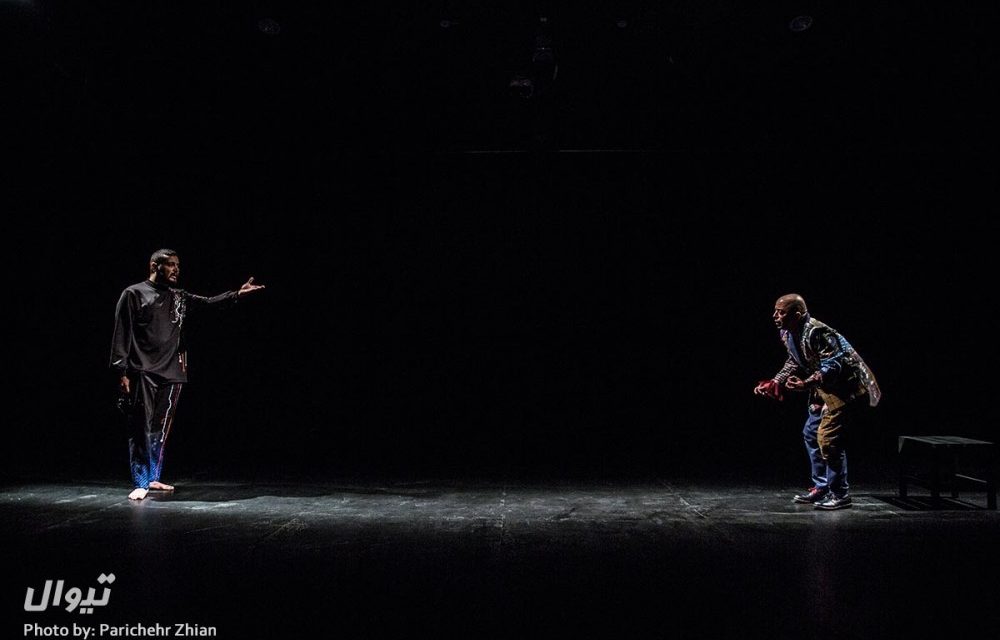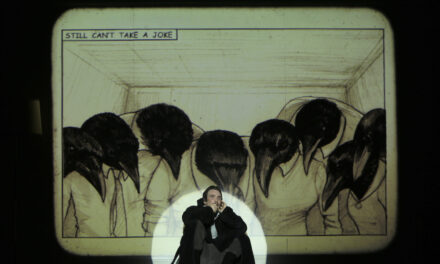Written, directed, and played by Mehrān Ranjbar, Steve Jobs was staged from October 18 to December 7, 2018 in Nofel-Loshato Theatre (a private theatre venue) in Tehran. Given the play was written to be performed by two actors only, Ranjbar, who played Steve Jobs, was joined by Farzin Mohaddes who appears as 10 most influential people in Jobs’ life, including Jobs’ gardener, Chrisann Brenann, the mother of Jobs’ daughter, Lisa, his daughter, and Judge Fredrick who was in charge of Jobs and Chrisann’s case, among others. The play was acclaimed for both Mohaddes’s exploitation of physical acting and Ranjbar’s controversial approach in reflecting on Jobs’ legacy.
Inspired by Walter Isaacson’s biographical account of Steve Jobs, Ranjbar attempted to excavate the dark side of human existence, through Jobs’ devilry, demons, and obsessions. As much as the plot was about Jobs, it was not limited to him and in a wider spectrum it highlighted the qualities of the postmodern human in a world disintegrated by various means of modernity, Jobs’ creations included. In this portrayal, Jobs has everything, yet he has nothing, he was embarrassed to be the son of Abdulfattah, and he easily dismissed the ones biologically connected to him as he proudly kept chanting: “Apple is more important to me than any scion.” Taking advantage of Jobs’ ideological dichotomies and melancholic thoughts in his later years, Ranjbar brought him into play to represent his own manifest: “Do you know why turtles are that slow? Because they know life is pointless and there is nothing at the end to be revealed.”
Mohaddes’ exceptional flawlessness in distinguishing various personas from each other, three females included, was praised by theatre critics and the audiences alike. To accentuate Mohaddes’ ability in such immaculate, believable acting, no makeup was applied and costume change was left to a minimum, except for disrobing his jacket when performing as a female character. While the factual elements of Jobs’ biography were told in a linear template, the form of narration was deliberately nonlinear to emphasize the existentiality of the context. In this regard, electronic circuit played a significant role as a motif in different elements of mise en scène, such as lighting, costume, and minimalistic use of furniture, all stressing the bleakness and detachment associated with modern life and high-tech mania.
Visual, behavioral, and vocal binary oppositions were also used to portray the potent dominance of the Binary Numeral System over modern human’s mindset. Jobs’ lethargic and inactive tone was pictured against the ardent and heated physical acting of Mohaddes when playing 10 personas, each with distinguishing physical, lingual, or vocal characteristics. A violinist started the show with a classic piece and he was later challenged by a modern pianist to a musical duel. Given this, the most prevalent oppositional motif recurrent in the play was the philosophical references to determinism and free will, while questioning Jobs’ incentive in making the decisions he has made throughout his life. Taking a universal viewpoint, the latter theoretical opposition undermined human’s state of power, in this case, Jobs’ relentless desire to become an omnipresent sovereignty in the world of technology.
This post was written by the author in their personal capacity.The opinions expressed in this article are the author’s own and do not reflect the view of The Theatre Times, their staff or collaborators.
This post was written by Somayeh Khani.
The views expressed here belong to the author and do not necessarily reflect our views and opinions.


















